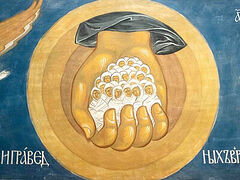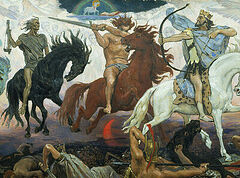And after these things I saw four angels standing on the four corners of the earth, holding the four winds of the earth, that the wind should not blow on the earth, nor on the sea, nor on any tree. And I saw another angel ascending from the east, having the seal of the living God: and he cried with a loud voice to the four angels, to whom it was given to hurt the earth and the sea, Saying, Hurt not the earth, neither the sea, nor the trees, till we have sealed the servants of our God in their foreheads (Rev. 7:1-3).
 Angels holding the four winds of the earth, 13th C.
Angels holding the four winds of the earth, 13th C.
Here an angel tells other angels not to do any harm until theseals have been placed on the foreheads of the servants of God. What does this mean in our modern language? We’ve said that our interpretations can be mistaken, because we can’t interpret these prophecies with certainty, with conviction. Apparently, it says here that the number of saved people, those who want to be saved, must be fulfilled. The Fathers of the Church tell us that the world will exist as long as there are people who want to be saved.
As long as the Divine Liturgy is celebrated, this world will stand. The world exists even for the sake of one man who desires to be saved and labor for the sake of salvation. As long as there are such people, they keep this world going. Why? Because there’s a certain meaning to the existence of the world. The world exists to serve for the salvation of men. If there were no means for the salvation of man in this world, if men didn’t know about salvation, then the existence of the world would become meaningless and the end would come. As long as there are people who labor for salvation, that is, as long as the Church exists, as long as the Divine Liturgy is celebrated for the sake of the salvation of the world, the end of the world is postponed. We have time left—we continue to live, until the end comes.
And I heard the number of them which were sealed: and there were sealed an hundred and forty and four thousand of all the tribes of the children of Israel (Rev. 7:4). The Apostle heard the number—144,000 from all the tribes of the son of Israel. This number, like all other numbers in the Revelation of the Apostle John, is symbolic—not a precise number. Somewhere it says half an hour, somewhere three years; however, these are not precise times, but symbolic numbers. 144,000 is 12 x 12,000. There were twelve tribes of Israel, so 12,000 from each tribe. Then St. John begins to list them: Of the tribe of Juda were sealed twelve thousand. Of the tribe of Reuben were sealed twelve thousand. Of the tribe of Gad were sealed twelve thousand (Rev. 7:5). And then 12,000 were sealed from the tribes of Aser, Nephthalim, Manasses, Simeon, Levi, Issachar, Zabulon, Joseph, and Benjamin (Rev. 7:6-8).
In the New Testament, Israel isn’t the Israel we know; it’s not the Jews. Israel in the New Testament is us Christians, the New Israel, the chosen people of God. Now, it’s not one nation (nationality), as the Jews used to be in Israel. They’ve completed the history of their relationship with God. The Kingdom of God left them and was given to another nation, which is no longer confined within the boundaries of nationality. It’s not the Greeks, the Russians, the Bulgarians, the Turks, or any other nation.
Any Orthodox Christian belongs to the New Israel. The children of the Church are only the Orthodox. The children of the Church are the children of the New Israel. Don’t be surprised that I say it’s only the Orthodox. The Orthodox Church is the Apostolic Church, which preserves the teaching and tradition of the Apostles. Many different heresies appeared over time, but the Orthodox Church remains faithful to what the Holy Apostles and Holy Fathers have handed on to us. These 144,000 spoken of here are obviously not the Jews, but people who are faithful to God—the children of the Church. But there won’t be exactly 144,000 of them. There will be many, a huge number. A straight 144,000 means completeness. If there were a specific number of the chosen, then someone would come and tell him: “Sorry, the number’s already been filled up. We’ve gathered 144,000—you’d be extra.” It’s impossible for someone to be left out, as if 144,000 and one more is impossible. May it not be so! This number is huge and will accommodate everyone who wants it. The Kingdom of Heaven is open to everyone. Everyone’s invited. God wants all people to be with Him, for countless numbers to be sealed.
Although the Apostle is talking about the tribes of Israel, there’s one he doesn’t mention: the tribe of Dan. Why? Because the antichrist is to come from the tribe of Dan. Therefore, St. John the Theologian removes the tribe of Dan here and adds the tribe of Benjamin.
 Veneration of the Lamb, Albrecht Dürer, 1497 After this I beheld, and, lo, a great multitude, which no man could number, of all nations, and kindreds, and people, and tongues, stood before the throne, and before the Lamb, clothed with white robes, and palms in their hands (Rev. 7:9). After the previous vision, what does St. John the Theologian see? There were countless people before him, a huge crowd that no one could count. It consists of people from every nation, every tribe, every tongue. They all stand before the throne and before the Lamb in white robes, holding palm branches in their hands. The white clothes symbolize, as you know, the purity of man, his non-participation in sins; thus, when we are baptized, we put on white robes. It’s customary to wear white robes, symbolizing enlightenment. People often even wear black, whatever they have. We have to put on white, because white symbolizes purity. This was revealed to holy, pure people in various visions. See, the throne of God and the throne of the Lamb is one throne, not different thrones. It’s not that God is here and the Lamb’s somewhere else, or Godis here and Christ is elsewhere. They’re in the same place at the same time.
Veneration of the Lamb, Albrecht Dürer, 1497 After this I beheld, and, lo, a great multitude, which no man could number, of all nations, and kindreds, and people, and tongues, stood before the throne, and before the Lamb, clothed with white robes, and palms in their hands (Rev. 7:9). After the previous vision, what does St. John the Theologian see? There were countless people before him, a huge crowd that no one could count. It consists of people from every nation, every tribe, every tongue. They all stand before the throne and before the Lamb in white robes, holding palm branches in their hands. The white clothes symbolize, as you know, the purity of man, his non-participation in sins; thus, when we are baptized, we put on white robes. It’s customary to wear white robes, symbolizing enlightenment. People often even wear black, whatever they have. We have to put on white, because white symbolizes purity. This was revealed to holy, pure people in various visions. See, the throne of God and the throne of the Lamb is one throne, not different thrones. It’s not that God is here and the Lamb’s somewhere else, or Godis here and Christ is elsewhere. They’re in the same place at the same time.
And cried with a loud voice, saying, Salvation to our God Which sitteth upon the throne, and unto the Lamb. And all the angels stood round about the throne, and about the elders and the four beasts, and fell before the throne on their faces, and worshipped God (Rev. 7:10-11). Do you remember the throne, the four animals around the throne, and the twenty-four elders around the throne? Now all the angels surrounding them prostrated and worshiped God, Saying, Amen: Blessing, and glory, and wisdom, and thanksgiving, and honour, and power, and might, be unto our God for ever and ever. Amen (Rev. 7:12). When we say “Amen” in church, it means “truly so.” The angels said that singing, praise, wisdom, thanksgiving, honor, power, and might truly belong to our God unto the ages.
If you count, you’ll see that seven things are listed here: glory, blessing, wisdom, honor, power, and so on. It’s symbolic. The number seven means perfection and completeness. Everything belongs to God, forever and ever. Our connection with God has no end. The praise of God has no end. Our standing before God will never end.
And one of the elders answered, saying unto me, What are these which are arrayed in white robes? and whence came they? And I said unto him, Sir, thou knowest. And he said to me, These are they which came out of great tribulation, and have washed their robes, and made them white in the blood of the Lamb (Rev. 7:13-14). St. John the Theologian saw this vision, but didn’t know who these people were. The elder told him that they came from great tribulation, great pain, from great sorrow, having endured persecution. They were martyrs, a whole host of martyrs, who washed their robes and whitened them by the Blood of the Lamb. When you wash your clothes in blood, they become red, not white. But what does the Blood of Christ do to our souls? It cleanses them.
Before him stood the martyrs of Christ, among whom were not only those who endured death, but also those who suffered for their love for Christ. Those who suffered tribulation, persecution, slander, exile and imprisonment, injustice, and illness. All of these people endured injustice in their lives; they’ve experienced pain, they’ve been completely crushed by sorrows (the word “sorrow” means melting, exhaustion, depletion, languor). Those dressed in white clothes, holding palms in their hands were martyrs. You know that palm branches symbolize victory and immortality. These people went through all kinds of tribulations and remained faithful to God; they didn’t renounce God, but washed their clothes and cleansed their souls. As we hear in Holy Week: “Make the robe of my soul to shine, O Giver of Light, and save me.”1 Those who suffered cleansed their souls such that they sparkled with purity from the washing in the Blood of the Lamb. Through communion of the Holy Mysteries, through faith, love, and union with Christ, living in the Church, living by the Sacraments, communing of the Body and Blood of Christ, they purified their souls and their entire being. Do you see how important it is to participate in the Sacraments, to commune of the Body and Blood of Christ? And how important it is to have patience. Therefore, Christ told us: In your patience possess ye your souls (Lk. 21:19).



